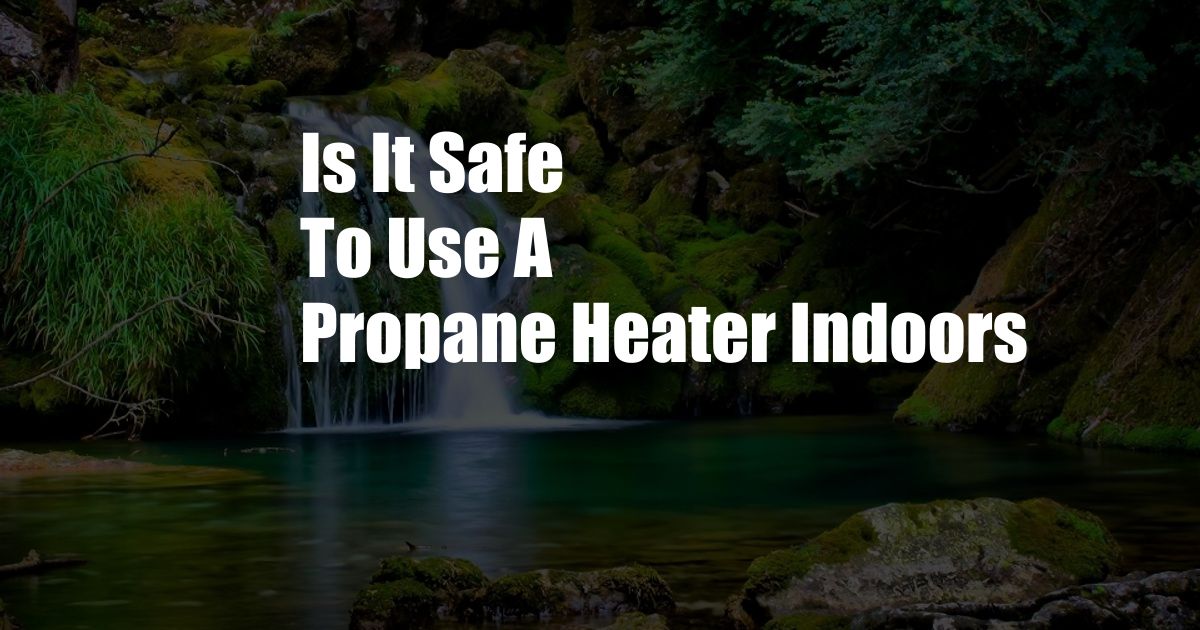
Is It Safe to Use a Propane Heater Indoors?
As a homeowner who lives in a cold climate, I’ve often found myself wondering if it’s safe to use a propane heater indoors. The thought of staying warm and cozy on a chilly night is certainly tempting, but safety should always be the top priority. In this article, I’ll delve into the topic in detail, exploring the risks and precautions associated with using propane heaters indoors.
Before we dive into the specifics, let’s start with a brief overview of propane heaters. Propane heaters, also known as LP gas heaters, are fueled by propane gas and provide a portable and convenient source of heat. They’re commonly used for outdoor activities like camping and grilling, but the question remains: are they suitable for indoor use?
Understanding the Risks of Using Propane Heaters Indoors
The primary risk associated with using propane heaters indoors is the potential for carbon monoxide poisoning. Carbon monoxide is a colorless, odorless gas that can be fatal if inhaled. When propane is burned, it produces carbon monoxide as a byproduct. If the heater is not properly ventilated, carbon monoxide can accumulate indoors, leading to poisoning symptoms such as headaches, dizziness, nausea, and even death.
Another concern is the risk of fire. Propane heaters produce an open flame, which can pose a fire hazard if proper precautions are not taken. Keep the heater away from flammable materials, such as curtains, furniture, and clothing. Additionally, ensure that the heater is placed on a stable surface to prevent it from tipping over.
Ensuring Safe Indoor Use of Propane Heaters
Despite the risks, it is possible to use propane heaters indoors safely by following these precautions:
- Proper Ventilation: The most important safety measure is to ensure adequate ventilation. Open a window or door to allow fresh air to circulate and prevent carbon monoxide buildup. Avoid using propane heaters in enclosed spaces, such as small rooms or bedrooms.
- Carbon Monoxide Detector: Install a carbon monoxide detector in the room where the heater is being used. This will alert you to dangerous levels of carbon monoxide and allow you to take immediate action.
- Fire Safety Precautions: Keep the heater away from flammable materials and place it on a stable surface. Never leave a propane heater unattended.
- Regular Maintenance: Have the heater inspected and serviced regularly by a qualified technician to ensure it is operating safely and efficiently.
- Follow Manufacturer’s Instructions: Always read and follow the manufacturer’s instructions carefully before using a propane heater indoors.
Tips for Safe and Effective Use
In addition to the safety precautions mentioned above, here are some expert tips for using propane heaters indoors:
- Use a small heater for small spaces. A heater that is too large for the space will produce excessive heat and increase the risk of carbon monoxide buildup.
- Avoid using propane heaters for long periods. Limit the use of propane heaters to short durations to reduce the risk of carbon monoxide exposure.
- Never use a propane heater as a primary source of heat. Propane heaters should be used as a supplemental heat source only.
- Inspect the heater regularly for leaks or damage. If you notice any problems, stop using the heater and contact a qualified technician.
- Store propane tanks outdoors. Always store propane tanks outside in a well-ventilated area.
Frequently Asked Questions (FAQs)
Q: Can I use a propane heater in my bedroom?
A: No, it is not recommended to use a propane heater in a bedroom due to the increased risk of carbon monoxide poisoning while sleeping.
Q: How often should I service my propane heater?
A: Propane heaters should be serviced annually by a qualified technician.
Q: What are the symptoms of carbon monoxide poisoning?
A: Symptoms of carbon monoxide poisoning include headaches, dizziness, nausea, and confusion.
Conclusion
Using propane heaters indoors can be a safe and effective way to stay warm, but it is crucial to prioritize safety. By following the precautions and tips outlined in this article, you can minimize the risks and enjoy the warmth of a propane heater indoors with peace of mind.
Are you interested in learning more about propane heaters or indoor heating safety? If so, I encourage you to conduct further research and consult with a qualified professional. Your safety and well-being are of utmost importance.